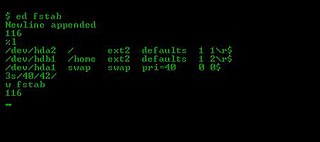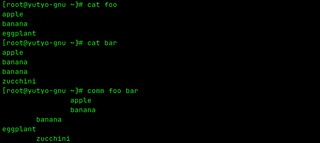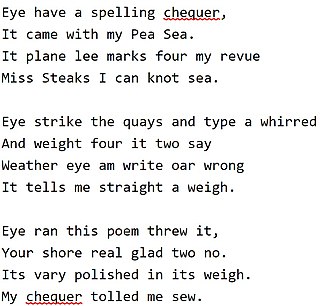
ed is a line editor for Unix and Unix-like operating systems. It was one of the first parts of the Unix operating system that was developed, in August 1969. It remains part of the POSIX and Open Group standards for Unix-based operating systems, alongside the more sophisticated full-screen editor vi.
troff, short for "typesetter roff", is the major component of a document processing system developed by Bell Labs for the Unix operating system. troff and the related nroff were both developed from the original roff.
Yacc is a computer program for the Unix operating system developed by Stephen C. Johnson. It is a Look Ahead Left-to-Right Rightmost Derivation (LALR) parser generator, generating a LALR parser based on a formal grammar, written in a notation similar to Backus–Naur Form (BNF). Yacc is supplied as a standard utility on BSD and AT&T Unix. GNU-based Linux distributions include Bison, a forward-compatible Yacc replacement.
uniq is a utility command on Unix, Plan 9, Inferno, and Unix-like operating systems which, when fed a text file or standard input, outputs the text with adjacent identical lines collapsed to one, unique line of text.

The comm command in the Unix family of computer operating systems is a utility that is used to compare two files for common and distinct lines. comm is specified in the POSIX standard. It has been widely available on Unix-like operating systems since the mid to late 1980s.

The Unix philosophy, originated by Ken Thompson, is a set of cultural norms and philosophical approaches to minimalist, modular software development. It is based on the experience of leading developers of the Unix operating system. Early Unix developers were important in bringing the concepts of modularity and reusability into software engineering practice, spawning a "software tools" movement. Over time, the leading developers of Unix established a set of cultural norms for developing software; these norms became as important and influential as the technology of Unix itself, and have been termed the "Unix philosophy."
dd is a command-line utility for Unix, Plan 9, Inferno, and Unix-like operating systems and beyond, the primary purpose of which is to convert and copy files. On Unix, device drivers for hardware and special device files appear in the file system just like normal files; dd can also read and/or write from/to these files, provided that function is implemented in their respective driver. As a result, dd can be used for tasks such as backing up the boot sector of a hard drive, and obtaining a fixed amount of random data. The dd program can also perform conversions on the data as it is copied, including byte order swapping and conversion to and from the ASCII and EBCDIC text encodings.

In software, a spell checker is a software feature that checks for misspellings in a text. Spell-checking features are often embedded in software or services, such as a word processor, email client, electronic dictionary, or search engine.
GNU Aspell, usually called just Aspell, is a free software spell checker designed to replace Ispell. It is the standard spell checker for the GNU operating system. It also compiles for other Unix-like operating systems and Windows. The main program is licensed under the GNU Lesser General Public License, the documentation under the GNU Free Documentation License. Dictionaries for it are available for about 70 languages. The primary maintainer is Kevin Atkinson.

tr is a command in Unix, Plan 9, Inferno, and Unix-like operating systems. It is an abbreviation of translate or transliterate, indicating its operation of replacing or removing specific characters in its input data set.

Ispell is a spelling checker for Unix that supports most Western languages. It offers several interfaces, including a programmatic interface for use by editors such as Emacs. Unlike GNU Aspell, ispell will only suggest corrections that are based on a Damerau–Levenshtein distance of 1; it will not attempt to guess more distant corrections based on English pronunciation rules.
MySpell is a spell checker that was formerly included with OOo Writer of the free OpenOffice.org office suite.

In Unix-like computer operating systems, a pipeline is a mechanism for inter-process communication using message passing. A pipeline is a set of processes chained together by their standard streams, so that the output text of each process (stdout) is passed directly as input (stdin) to the next one. The second process is started as the first process is still executing, and they are executed concurrently. The concept of pipelines was championed by Douglas McIlroy at Unix's ancestral home of Bell Labs, during the development of Unix, shaping its toolbox philosophy. It is named by analogy to a physical pipeline. A key feature of these pipelines is their "hiding of internals". This in turn allows for more clarity and simplicity in the system.
This article provides basic comparisons for notable text editors. More feature details for text editors are available from the Category of text editor features and from the individual products' articles. This article may not be up-to-date or necessarily all-inclusive.
cpio is a general file archiver utility and its associated file format. It is primarily installed on Unix-like computer operating systems. The software utility was originally intended as a tape archiving program as part of the Programmer's Workbench (PWB/UNIX), and has been a component of virtually every Unix operating system released thereafter. Its name is derived from the phrase copy in and out, in close description of the program's use of standard input and standard output in its operation.
Hunspell is a spell checker and morphological analyser designed for languages with rich morphology and complex word compounding and character encoding, originally designed for the Hungarian language.

In computing, sort is a standard command line program of Unix and Unix-like operating systems, that prints the lines of its input or concatenation of all files listed in its argument list in sorted order. Sorting is done based on one or more sort keys extracted from each line of input. By default, the entire input is taken as sort key. Blank space is the default field separator. The command supports a number of command-line options that can vary by implementation. For instance the "-r" flag will reverse the sort order.
In Unix computing, crypt or enigma is a utility program used for encryption. Due to the ease of breaking it, it is considered to be obsolete.

Unix is a family of multitasking, multi-user computer operating systems that derive from the original AT&T Unix, whose development started in 1969 at the Bell Labs research center by Ken Thompson, Dennis Ritchie, and others.

cat is a standard Unix utility that reads files sequentially, writing them to standard output. The name is derived from its function to (con)catenate files. It has been ported to a number of operating systems.









